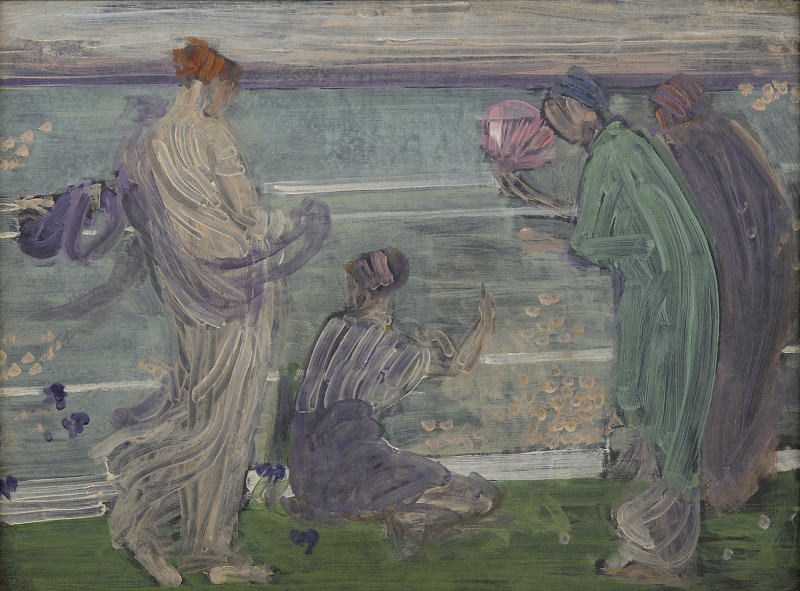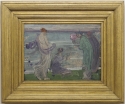Composition
The painting shows numerous alterations. Some of the overpainting is difficult to interpret, particularly the dark green around the shoulders of the two left-hand figures; the line of the balcony and railing runs right into the drapery of the second figure from the right.
There are numerous studies related to the painting, with variations on the pose of the figures.
Two drawings ̶ r.: A composition - draped figures on a terrace; v.: Studies for 'Variations in Blue and Green' [M.0343] and Study for 'Variations in Blue and Green' [M.0346] ̶ show a reclining figure beside the seated woman. The draperies, which can be seen to the right of the seated figure in the painting and which have been painted over in green, may relate to this second figure.
Technique
It has been painted on a dark ground, with several layers of creamy paint, slightly impasted, applied with sweeping breaststrokes, plus wriggly squiggles, blobs, dashes and dots.
As Marc Simpson comments, in the 'Six Projects' Whistler 'experimented with a thinned, nearly liquid paint, one responsive to the pressure of the brush so totally that a single stroke could vary from translucent to opaque and back again.' 1
Conservation History
For some time Whistler had five of the 'Six Projects' hanging in his house in Cheyne Walk. In June 1892 they were cleaned and varnished by Stephen Richards (1844-1900), his picture restorer in London. Whistler then asked David Croal Thomson (1855-1930) to retrieve them from Richards and send them to him in Paris, urgently, 'I want my small pictures that you gave him to clean and varnish ... the sketches that used to hang in the dining room, Cheyne Walk.' 2
However, when they arrived he wrote to Richards from Paris:
'I have just received the five small paintings on millboard - (sketches of figures & sea) - that you have cleaned & varnished for me. They look pure and brilliant as on the day they were painted! -
But while you were about it, I wish enough you had seen to the condition of their backs - They were put down upon other cardboards some time ago, and they are all loose and bent about now ...
How could you let them leave your place, clean and freshly varnished as they were, unframed!
This is so unlike your usual thoughtfulness and great care! I was horrified! However happily they are unharmed.' 3
According to Freer Gallery conservation files, it was cradled, cleaned and resurfaced in 1931, resurfaced in 1942, cleaned and resurfaced in 1951.
Frame
For some time between 1890 and 1892 Whistler had the so-called 'Six Projects' (actually five!) hanging in his house in Cheyne Walk, although they were not exhibited. The five ' Projects' were certainly framed by 1892, when they were cleaned and varnished by Stephen Richards (1844-1900), but returned to the artist, as he complained 'without their frames.' 4
The Grau-style frame is of similar construction to the frames on the other 'Projects'. 5 It was certainly on the frame by 1904, as seen in the photograph above.
Notes:
1: Simpson, Marc, 'Whistler, Modernism, and the Creative Afflatus', in Simpson, Marc, Like Breath on Glass: Whistler, Inness, and the Art of Painting Softly, Sterling and Francine Clark Art Institute, Williamstown, MA, 2008, pp. 24-51, at pp. 31-32, 34, repr. p. 33.
4: Ibid.
5: Dr Sarah L. Parkerson Day, Report on frames, 2017; see also Parkerson 2007 [more] .
Last updated: 23rd November 2020 by Margaret












